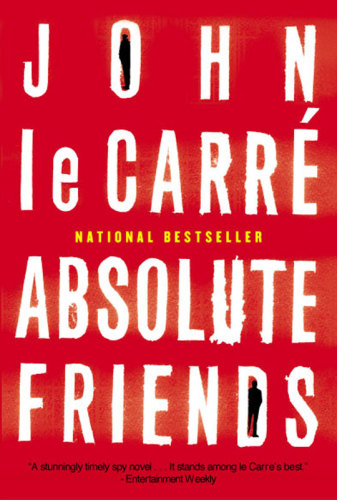
Absolute Friends
کتاب های مرتبط
- اطلاعات
- نقد و بررسی
- دیدگاه کاربران
نقد و بررسی

Starred review from November 24, 2003
Le Carré may have changed publishers, but his latest novel remains as resolutely up-to-date as ever. In place of the old Cold War games, his recent books have dealt with the depredations of international arms merchants and the impact of predatory drug manufacturers on the Third World. Now his eloquent and white-hot indignation is turned on what he sees as a duplicitous war in Iraq and the devious means employed to tarnish those who oppose it. The friends of the title are two beautifully realized characters, both idealists in their very different ways. Ted Mundy, the bighearted son of a pukka Indian Army officer, leads a life in which his inborn kindliness and lack of self-regard are turned to what he sees as good causes. With Sasha, the crippled son of an old Nazi who turns bitterly against that past only to be tormented by the rise of a new brutalism in East Germany, he forms a double-agent partnership that feeds British intelligence during the Cold War years. With the collapse of the Soviet system, Ted is at loose ends, trying both to make ends meet as a cheery tour guide for English-speaking visitors to Mad Ludwig's castle in Bavaria and to support his Muslim wife and her small son in Munich. Suddenly he hears again from Sasha, who tells him that a mysterious benefactor wishes to enlist his services as teacher and translator to counter the widespread propaganda on behalf of an Iraqi war, and he is inflamed once more with a desire to help. The grim consequences are spelled out by le Carré with a deadly fury that is startling in the context of his usual urbanity. With a largely German setting that recalls some of his earliest books, as well as the same embracing clarity of vision about human motives and failings that gleams through all his best work, this is a book that offers a bitter warning even as it delivers immense reading pleasure. (One-day laydown Jan. 12)
Forecast:
No reader, whatever his politics, could fail to be moved by the passion and intelligence of le Carré's latest. For those who feel as he does about the war and its consequences, this book will be a special gift.

January 1, 2004
Meet Ted Mundy, "actor, novelist, befriender, major's son, misfit, dreamer and pretender," going about his job as a tour guide in one of Mad King Ludwig's Bavarian castles when an old comrade emerges from the shadows. Sasha is a charismatic firebrand who has ruddered Mundy's eventful odyssey on two of its major courses-those of radical and spy-and is now recruiting for a bold and improbable plan to save the world. For many readers, it will be enough to say that this is excellent le Carre, with a beguilingly oblique approach to story, intriguing and morally complex characters, penetrating wit, deft turns of phrase, and a nuanced synthesis of personal and political concerns. As the catastrophe approaches, politics gains the upper hand, and it is no small surprise that the biggest villain on the present world stage turns out to be a certain "renegade hyperpower that thinks it can treat the rest of the world as its allotment." While this pointed morality may seem abrupt to readers rapt in the author's wonted, murky casuistry and all-embracing skepticism, one can hardly fault such a skilled and perceptive storyteller for bringing a conscience into the bargain. Highly recommended.-David Wright, Seattle P.L.
Copyright 2003 Reed Business Information.

Starred review from December 1, 2003
There has been a linear evolution in the mind-set of le Carre's spies over the years--from agonizing over the moral ambiguity of the craft set against a firm belief in its necessity (the Smiley novels), through opting to place individual values over national ones (" A Perfect Spy" and " Russia House"), to recognizing that bureaucracy has poisoned the intelligence business from within (the post-cold war novels). Now, driven by recent world events, that evolution takes an even more radical step--to the realization that ideology is irrelevant, that powerful governments are an evil unto themselves, forever the enemy of individual life. It is a harrowing journey to that somber knowledge for Ted Mundy, expatriate son of a British army officer, and his "absolute friend," the crippled German radical Sasha, whose idealism finally engenders its own chaos and makes him easy prey for the powerful. Jumping backward and forward in time, le Carre reveals the history of a friendship in the context of a lifetime of commitment gone sour: student radicalism in Berlin during the '60s; active spying for the West during the waning years of the cold war; and, finally, a parting of the ways, with Sasha continuing to search for the revolution of his dreams while Teddy finds a separate peace. But Iraq and a reunion with his friend reignite Teddy's fervor, paving the way for the inevitable tragedy. Yes, le Carre uses Teddy as a mouthpiece for some strong political opinions (the U.S. is described as a "hyperpower that thinks it can treat the rest of the world as its allotment"), but the novel never becomes the author's soapbox. The human story remains paramount, even if the chilling message is that human stories don't stand much of a chance in the world as we find it.(Reprinted with permission of Booklist, copyright 2003, American Library Association.)

























دیدگاه کاربران